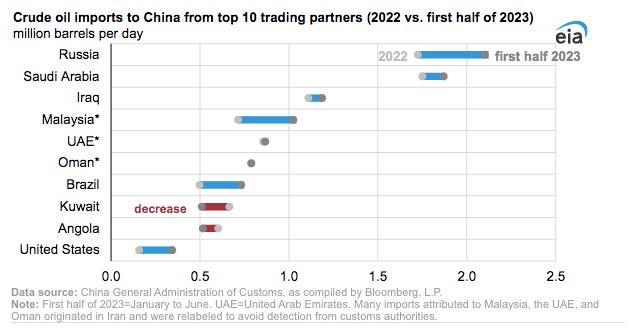Oil's New Chessboard: Why Today's Crisis Isn't Your 1970s Showdown
Rather than bracing for an oil price surge, the world might be on the verge of a sharp decline reminiscent of the post-Gulf War period in the 1990s.
One might be inclined to view the present Israel-Hamas conflict through the lens of the Yom Kippur War, speculating on a potential oil price surge reminiscent of the 1970s. Yet, such an analysis would be oversimplified. The global macro stage has undergone a transformation. Here's why:
1. U.S. Oil Dynamics: In the 1970s, the U.S. imported 10 million barrels of oil daily. Fast forward to today, it exports 1 million.
2. The U.S. as an Oil Behemoth: America now stands as the world's leading oil producer, churning out nearly 13 million barrels per day. Remarkably, it adds almost 1 million barrels to this tally annually.
3. China's Thirst for Oil: China has emerged as the premier oil importer, consuming 12 million barrels each day
.
4. China's Oil Diplomacy: The vast majority of China's oil comes from nations like Russia, Saudi Arabia, Iraq, Iran and Malaysia.
5. Iran's Influence: Reports indicate that China imports up to 1.5 million barrels daily from Iran alone.
6.Saudi Arabia's Geopolitical Play: While Saudi Arabia might be seen as a geopolitical adversary to Iran, and by extension, possibly Hamas, it doesn't necessarily champion Palestinian interests.
7. Iran's Rising Production: Iran's oil production is not only rebounding but also has the potential to touch 4 million barrels daily.
8. Saudi's Strategic Move: Contrary to popular belief, Saudi Arabia's strategic play might not be to restrict oil supply. Instead, it could be to saturate the market, thereby bankrupting competitors and seizing a more substantial share of the Eurasian market. Case in point: Saudi's oil production rose from 9.9 million to 12 million barrels.
9. The Real Global Threat: Rather than bracing for an oil price surge, the world might be on the verge of a sharp decline reminiscent of the post-Gulf War period in the 1990s. This could represent an economic checkmate against both Russia and Iran.
Kind regards,
Guillermo Valencia A
Brazil, 9th October 2023











